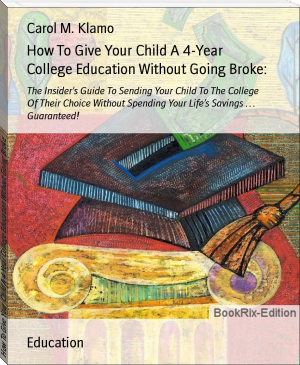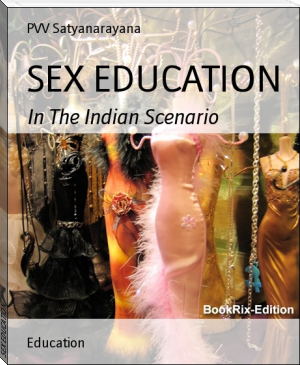How To Give Your Child A 4-Year College Education Without Going Broke: by Carol M. Klamo (best free ebook reader for pc TXT) 📖

- Author: Carol M. Klamo
Book online «How To Give Your Child A 4-Year College Education Without Going Broke: by Carol M. Klamo (best free ebook reader for pc TXT) 📖». Author Carol M. Klamo
Mistake #6:
Not understanding the difference between “included assets” and “un-included assets” for purposes of filling out financial aid forms.
Reality:
Certain assets are counted much more heavily in the financial aid formulas than others. For example, savings accounts, CD’s, stocks and bonds are all included and asked about on the Federal Financial Aid form. However, it does not ask about the value of annuities or cash-value life insurance anywhere on that same form.
Mistake #7:
It doesn’t matter where I keep my money; it’s all counted in the same way.
Reality:
Nothing could be further from the truth. Where you keep your money could mean the difference between you getting $10,000 in financial aid or getting nothing! For example, money in the child’s name is weighted much more heavily than money in the parent’s name. If you don’t know how to legally and ethically position your money properly for purposes of financial aid, you could end up losing thousands in financial aid!
Mistake #8:
“My CPA or tax preparer is qualified to fill out my financial aid forms - I’ll let him/her do it.”
Reality:
Unfortunately, CPA’s and tax preparers are experts at tax planning and preparation – not necessarily financial aid planning. For example, a CPA or tax preparer might suggest that you put some or all of your assets in your child’s name to save money on taxes. While this advice is well meaning, it will usually kill most or all of your chances of getting financial aid. Also, most CPA’s and tax preparers are not trained in filling out financial aid forms. In many cases, they will unknowingly fill out these forms improperly (i.e., reporting assets and income that don't legally need to be reported, etc.), and these “minor” mistakes could cost you time and money. If this happens, you will have to re-submit these forms all over again, and you will probably end up losing thousands in financial aid since it is awarded on a first come, first served basis.
Mistake #9:
Waiting until January or even worse after January of your child’s senior year of high school to start working on your college financial aid planning.
Reality:
Since financial aid is based on your previous year’s income and assets, it is imperative to start your planning as soon as possible before January of your child’s senior year. If you want to legally set up your income and assets so you can maximize your eligibility for financial aid, you must start working on this, at least, one year in advance - preferably in the beginning of your child’s JUNIOR year of high school. The longer you wait and the closer it gets to your child’s senior year, the tougher it gets to set up your financial picture without creating a “red flag” for the colleges and universities. It is also important for you to know what your “Expected Family Contribution” is so you can start saving for it. And, you should also know which schools can give you the best packages before you start visiting and applying to them. My advice is if you haven’t started planning, DO IT NOW!
Mistake #10:
Going Through The Financial Aid Process By Yourself Because It’s “Cheaper”.
Reality:
If this describes you, the colleges and Federal Government are going to love you! This allows them to keep control over the process instead of you, the parent, understanding how the process works and taking back control from them. It always amazes me that people will readily use a doctor when they get sick, a lawyer when they get sued, but suddenly when they are going to send their child to college and spend between $16,000 - $38,000 per year, parents want to save themselves a couple of dollars and do it themselves. Unless you spent the last 5 - 10 years of your life studying and understanding the financial aid process, there is no way you are going to know how to get the maximum amount of money from each school. And, if you do try it yourself, you’ll probably spend countless hours trying to figure it out. The moral to this story is “Don’t Be Penny Wise And Dollar Foolish!” Use an expert who can help you through this process and make sure you get everything you’re entitled to.
Chapter #2
“4 Little-Known Reasons Why You Should Start Planning For Your Child’s College Education NOW - Even If You Have No Idea What Schools They Want To Apply To...”
Most families (and people in general) wait until the absolute last minute to do everything.
That’s why very few people end up financially prepared to pay for weddings, homes, retirement, and college educations for their children.
Well, since we only have a limited amount of space and considering the focus of this book is college funding - we’re going to discuss 4 little-known reasons why you should start planning for your child’s college education in their JUNIOR year of high school (if not earlier).
Reason #1:
Money Saved In The Wrong Places Could Cost You A Fortune In Lost Financial Aid.
Did you know that money saved in the wrong places could count as much as 7 times more heavily than money saved in the right places?
It is important that you determine which assets you have accumulated in the “wrong” places so you can either gift, transfer or reposition them before you have to apply for financial aid.
If you wait until the last minute to do this (your child’s senior year), it will be too late to change your financial picture, and you will end up losing thousands of dollars in financial aid that you would have been eligible for.
Reason #2:
You Must Know How Much Your Family Will Be Expected To Contribute Towards College Costs.
No matter which schools your child ends up applying to, the government will expect you to pay your fair share towards the cost of college. They call this your “Expected Family Contribution” and this is the minimum amount of money any school will expect you to pay towards your child’s education.
The sooner you know what this number is, the sooner you can start saving to accumulate at least enough to cover this minimum amount.
If you wait until your child’s senior year of high school to find out what your family contribution is, you will have no time to do any saving - and this means borrowing more money to cover the costs of your child’s college education!
Reason #3:
You Want Your Child To Pick Schools Based On The Schools Ability To Give You Money.
Most students and parents pick schools whimsically without giving any consideration to which schools have the best ability to meet their financial needs.
What happens is that most students start picking schools towards the end of their junior year, visit them during the summer, and then start applying to them in their senior year of high school.
The entire process is very costly between travel and application expenses, and most students and parents are stunned at the end of their senior year when they find out there is no way they can afford most of the schools they applied to!
This scenario can easily be avoided by finding out which schools have the best histories of giving good financial aid packages - more FREE money, less loans!
By finding out this information in your child’s JUNIOR year of high school, you can avoid spending time and money traveling and applying to schools that will never be able to give you the money you need.
Reason #4:
You Must Start, At Least, One Year In Advance If You Want To Apply For Private Scholarships.
Although private scholarships only make up 3.7% of all the money that exists for college funding, it still can be worth looking for some of these funding sources.
Private Scholarships are sources of FREE money that never have to be re-paid.
Private foundations and organizations offer them to students based on their ethnic background, religious affiliation, talents, hobbies, skills, interests, athletic abilities, etc.
You can only get these sources of funding if you apply for them, and you can only locate and apply for them if you start looking in your child’s JUNIOR year of high school.
* * *
These 4 little-known reasons could mean the difference between you getting thousands of dollars in college funding or not being able to afford to send your child to the college or university of his/her choice.
Chapter #3
“A Checklist Of Things You Should Be Doing Right Now If You’re The Parent Of A College-Bound High School Junior...”
In this chapter, we’re going to discuss things you should be doing right now
if your child is nearing the end of his or her junior year of high school.
But, before I tell you what you should do, I’d like to tell you what you shouldn’t do
...
Don’t Get Lulled Into A False Sense Of Security!
Most parents (and people) get a strange disease called “summer fever” right around when the weather starts getting nice again.
Symptoms include leaving work early, taking half-day Fridays, playing golf and tennis, being more active than usual, and...
Blowing Off Every Important Financial
Decision Until After The Summer’s Over!
This is usually a big mistake. Panic attacks and nervous episodes start occurring sometime in August as a result of this.
Don’t Let This Happen To You!
Don’t misunderstand me. Go out and enjoy your summer. Live life to the fullest. Take long weekends and vacations.
But, don’t forget to start planning for your child’s college education!
Here’s a checklist of things you should be doing right now if you’re the parent of a college-bound high-school junior:
1. Start Visiting Colleges And Universities That Your Child Is Interested In Applying To.
Most high school students base their decisions on where they want to go to college on “word of mouth”. They listen to what their friends say is a good school, or they consult college guides, magazines, and guidance counselors.
Whichever way they decide on their college choices, they must visit the campuses of these schools first to get a good feeling for what each school is like.
Do they want a small town or big city environment? Big or small class sizes? Fraternities or sororities? Good weather or bad weather? What are the people on campus like - cool, nerdy, whatever?
These questions can only be answered by visiting the schools, and now is the time to do it before they apply.
2. Have Your Child Take A Good Test Preparation Course To Get A Better SAT Score.
The good colleges are getting more and more
 The desire to acquire knowledge about the surrounding world and human society is quite natural and understandable for a person. Life is so developed that an uneducated person will never occupy a high position in any field. Humanity in its mass, and each person individually, develops objectively, regardless of certain life circumstances and obstacles, but with different intensity. The speed of development depends on the quality of training.
The desire to acquire knowledge about the surrounding world and human society is quite natural and understandable for a person. Life is so developed that an uneducated person will never occupy a high position in any field. Humanity in its mass, and each person individually, develops objectively, regardless of certain life circumstances and obstacles, but with different intensity. The speed of development depends on the quality of training.




Comments (0)